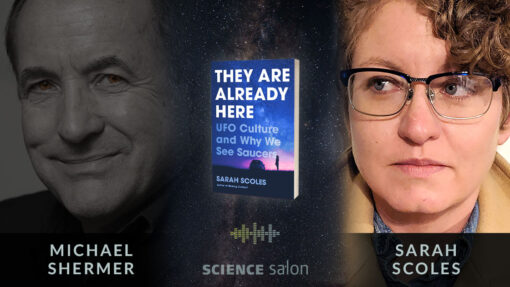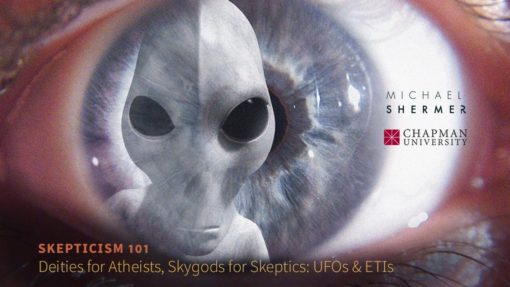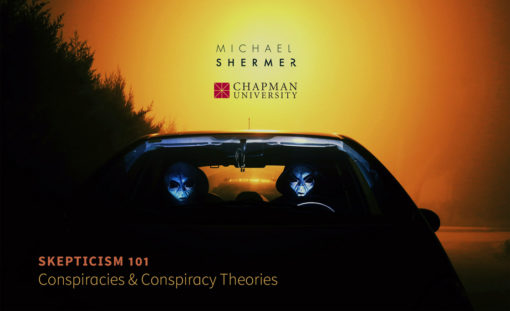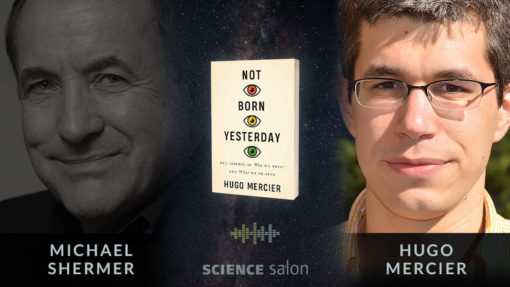In episode 150 of The Michael Shermer Show, Harvard professor of human evolutionary biology Daniel Lieberman discusses his pioneering researcher on the evolution of human physical activity in his book Exercised: Why Something We Never Evolved to Do is Healthy and Rewarding. PLUS: Perhaps one of the most bizarre beliefs rampant in modern times is that malign, shape-shifting reptilian extraterrestrial invaders, disguised as human beings, secretly control the governments of the world. It is possible that we recently experienced a…
Tags
-
browse by topic
conspiracy theories
eSkeptic for January 5, 2021
Lizard People, 5G and the Nashville Bomber

Perhaps one of the most bizarre beliefs rampant in modern times is that malign, shape-shifting reptilian extraterrestrial invaders, disguised as human beings, secretly control the governments of the world. It is possible that we recently experienced a violent consequence of that belief.
Donald R. Prothero — Weird Earth: Debunking Strange Ideas About Our Planet

Shermer and Prothero discuss: flat earth theories and how we know the earth is round • hollow earth theories and how we know it’s not hollow • the return of Ptolemy and an earth-centered solar system model (and how we know it’s wrong) • how science deals with anomalies and fringe claims • Were humans in the San Diego area 130,000 years ago? • flood myths • the age of the earth and how geologists determined it, and more…
eSkeptic for December 8, 2020
We are pleased to announce Skeptic’s 100th issue (25.4) which focuses on QAnon in conspiratorial context. Instantly download the digital edition or order the print edition today. PLUS: In Science Salon podcast # 146, Michael Shermer speaks Donald Prothero about his new book Weird Earth: Debunking Strange Ideas About Our Planet.
Sarah Scoles — They Are Already Here: UFO Culture and Why We See Saucers

More than half a century since Roswell, UFOs have been making headlines once again. Scoles ventured to dark, conspiracy-filled corners of the internet, to a former paranormal research center in Utah, and to the hallways of the Pentagon to meet the bigwigs, the scrappy upstarts, the field investigators, the rational people, and the unhinged kooks of this sprawling UFO community.
eSkeptic for July 28, 2020
More than half a century since Roswell, UFOs have been making headlines once again. In Science Salon # 126 Michael Shermer speaks with Sarah Scoles about her new book They Are Already Here: UFO Culture and Why We See Saucers.
Why People Believe Conspiracy Theories
What is a conspiracy, and how does it differ from a conspiracy theory? Michael Shermer explains who believes conspiracy theories and why they believe them in the following essay, derived from Lecture 1 of his 12-lecture Audible Original course titled “Conspiracies and Conspiracy Theories: What We Should Believe and Why.”
eSkeptic for July 17, 2020
Dr. Anondah Saide and Dr. Kevin McCaffree examine whether political party identification is associated with tolerant attitudes towards individuals with different political views. ALSO, Michael Shermer explains who believes conspiracy theories and why they believe them in an essay derived from a lecture on conspiracies and conspiracy theories.
eSkeptic for June 30, 2020
In Science Salon # 122 Michael Shermer speaks with Walter Scheidel as he recounts the gripping story of how the end of the Roman Empire was the beginning of the modern world. PLUS, Harriet Hall, M.D. sets the record straight on wearing face masks during the COVID-19 Pandemic.
Wear a Mask, But Act as If It Doesn’t Work

Masks have been proven to reduce the spread of COVID-19, but instead of believing the evidence and following public health guidelines, many people have turned mask wearing into a political statement. They are refusing to wear masks for reasons that are laughable. Rejecting masks is selfish: it means they don’t care if other people get sick and die. Here’s what Harriet Hall, M.D., The SkepDoc, has to say about it.
eSkeptic for June 26, 2020
In a lecture, Dr. Michael Shermer addresses one of the deepest questions of all: what is truth? Following that, Lee McIntyre and Michael Shermer debate whether we are living in a Post-Truth era of fake news and alternative facts.
The Truth About Post-Truth Truthiness

Is post-truth the political subordination of reality? Is truth itself any more under threat today that in the past? Have the populists & postmodernists won the day? In response to Dr. Lee McIntyre’s essay, Dr. Michael Shermer asserts that people are not nearly as gullible as some believe.
eSkeptic for May 1, 2020
The media keeps making claims that the Pentagon supposedly announced that UFOs are ‘real.’ How much of that is really true? Robert Sheaffer — a leading skeptical investigator of UFOs — separates the facts from the hype. Plus: Dr. Michael Shermer examines the claims about the Bermuda Triangle using the tools of skepticism, science, and rationality to reveal that there is no mystery to explain.
Claims About a Government “UFO Program”: How Much is True?

The media keeps making claims that the Pentagon supposedly announced that UFOs are ‘real.’ How much of that is really true? Robert Sheaffer — a leading skeptical investigator of UFOs — separates the facts from the hype.
Deities for Atheists, Skygods for Skeptics: UFOs & ETIs

Dr. Michael Shermer distinguishes between two questions: (1) Are extraterrestrial intelligences (ETIs) out there somewhere in the cosmos? and (2) Have aliens come here? Evidence for both questions is considered in the larger context of why the issue so compels us to answer it almost religiously.
eSkeptic for April 7, 2020
Dr. Michael Shermer distinguishes between two questions: (1) Are extraterrestrial intelligences (ETIs) out there somewhere in the cosmos? and (2) Have aliens come here? Evidence for both questions is considered in the larger context of why the issue so compels us to answer it almost religiously.
Conspiracies & Conspiracy Theories

Dr. Michael Shermer explains the difference between conspiracies and conspiracy theories, who is more likely to believe which conspiracy theories, the social, political, cultural, and psychological conditions in which conspiracy theories flourish, real conspiracies, and who really killed JFK.
The Phantom Drone Scare: Mass Hysteria Can Be Ruled Out

The recent spate of drone sightings in the Midwest have residents on edge. Medical sociologist Robert Bartholomew avers that one explanation can be ruled out — mass hysteria.
eSkeptic for February 4, 2020
In Science Salon # 102 Michael Shermer speaks with Christopher Ryan about his new book: Civilized to Death: The Price of Progress. PLUS, The recent spate of drone sightings in the Midwest have residents on edge. Medical sociologist Robert Bartholomew avers that one explanation can be ruled out — mass hysteria.
Hugo Mercier — Not Born Yesterday: The Science of Who We Trust and What We Believe

Not Born Yesterday explains how we decide who we can trust and what we should believe — and argues that we’re pretty good at making these decisions. Hugo Mercier demonstrates how virtually all attempts at mass persuasion — whether by religious leaders, politicians, or advertisers — fail miserably.
SKEPTIC App
Whether at home or on the go, the SKEPTIC App is the easiest way to read your favorite articles. Within the app, users can purchase the current issue and back issues. Download the app today and get a 30-day free trial subscription.








